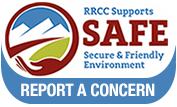Behavioral Intervention Team (BIT)
“Red Rocks Community College cares about the safety, health, and well-being of its
students, faculty, staff and community. The Red Rocks Community College Behavioral
Intervention Team (BIT) was established to promote and maintain the safety and
well-being of the campus community through positive, proactive, and practical risk
assessment and intervention. I encourage you to read all of the information provided
on this website to familiarize yourself with when and how to report a concern.”Lisa Fowler, Ed.D.
Vice President for Student Affairs
Red Rocks Community College

If you have seen something, you have come to the right place.
Say something here.
Reasons for Reporting a Concern
You should refer individuals for whom you have a concern, who are exhibiting behaviors that pose a threat to safety or that cause a significant disruption to the RRCC community.
Signs to look for include:
- Self-injurious behavior
- Suicide ideation or attempt - Suicide Prevention Emergency Contacts can be read here.
- Danger or threat to others (violence, threats or implied threats of violence and intimidation)
- Possession of a weapon
- Inability of an individual to take care of themselves (concern for mental health or substance abuse issues).
- Erratic behavior that is disruptive to the normal proceedings of the College community.
If you are making a referral directly to the campus Behavioral Health Counselor, you may also submit a “Report of Concern” (see link on this page).
If you believe your referral requires more immediate attention, please call Dr. Lisa Fowler, Vice President of Student Affairs, at 303.914.6388.
NOTE: In cases where a student’s behavior poses an imminent threat to you or another, contact 911 or RRCC Campus Police at 303.914.6394.
Why should I be concerned?
As the eyes and ears of our community it is everyone’s responsibility to take action and assist those individuals who show any type of behavior that could threaten their own safety or the well-being of the Red Rocks college community. We all play a vital role in ensuring the safety of our students, faculty, and staff.
The BIT strongly encourages you to utilize its referral services to better serve and enhance our community. Please know the success of this process hinges on community commitment to reporting concerns.
What should I be concerned about?
The following behaviors can all be important signs of distress. As a member of the Red
Rocks community, you may notice a student exhibiting one or more of the academic,
physical, or emotional signs and decide that something is clearly wrong. Or you may have
a “gut-level feeling” that something is wrong. If the latter is the case, don’t dismiss your
feelings or feel that you need to wait for tangible “proof” that a problem exists. A simple
check-in with the student may help you get a better sense of his/her situation.
Physical signs
- Falling asleep in class or other inopportune times
- A dramatic change in energy level (either direction)
- Worrisome changes in hygiene or personal appearance
- Significant changes in weight
- Frequent state of alcohol intoxication (i.e., bleary-eyed, hung-over, smelling of alcohol)
- Noticeable cuts, bruises or burns on student
Emotional signs
- Inappropriate emotional outbursts (unprovoked anger or hostility, sobbing)
- Exaggerated personality traits; more withdrawn or more animated than usual
- Expressions of hopelessness, fear or worthlessness; themes of suicide, death, and
dying in papers/projects - Direct statements indicating distress, family problems, or other difficulties
- Peer concern about a fellow student (in class, lab, residence hall, club)
Academic signs
- Deterioration in quality/quantity of work
- A negative change in classroom or research performance (e.g., drop in grades)
- Missed assignments or exams
- Repeated absences from class or from research lab
- Disorganized or erratic performance
- Decline in enthusiasm in class (e.g., no longer choosing a seat in the front of the room)
- Student sends frequent, lengthy, “ranting” or threatening types of emails to instructor
- Continual seeking of special provisions (e.g., late papers, extensions, postponed exams, and projects)
It’s possible that any one of these signs, in and of itself, may simply mean that a student is having an “off” day.
Please note, however, any one serious sign (e.g., a student writes a paper expressing hopelessness and/or thoughts of suicide) or a cluster of smaller signs (e.g., emotional outbursts, repeated absence, a noticeable cut on the arm) necessitates an intervention.
NOTE: In cases where a student’s behavior poses an imminent threat to you or another, contact Police immediately at 911.
How do I help?
Please consider the following:
Speaking with the student individually.
Filling out a form to report your concern.
Show you care, connect on a feeling level: listen.
“I’m concerned about you and noticed you haven’t been sleeping, eating, going to
class, etc.”
“How are you feeling?”
Reflect back their feelings and paraphrase:
“What I hear you say is that you are in a great deal of pain and feel hopeless.”
“I’m glad you called.”
Listen with respect. Individuals in distress want understanding and care.
Ask about suicide directly.
“Sometimes when people feel sad, they have thoughts of killing themselves. Have you had such thoughts?”
“Are you thinking of killing yourself?”
“Have you considered suicide?” “How would you go about it?”
“When would you do that?”
Remember, asking about suicide does NOT put the idea in people’s minds.
Get help. Explore options. Offer resources.
“What would help now?” “Who can help? Who usually helps?” “How can I help?”
Get assistance. Avoid trying to be the only lifeline for this person. Seek out resources even if it means breaking a confidence.
“How would you feel about visiting Counseling Services? Let’s call right now. I’ll walk over with you to see a counselor.”
Behavioral Health Counselor (contracted through Jefferson Center for Mental Health), Deborah Hunt, 303-914-6316, Room 1268 in the Learning Commons. Monday thru Friday, 8:00 a.m. to 5:00 p.m. (Arvada Campus hours to be determined). For the website, click here: http://www.rrcc.edu/behavioral-health-services
National Suicide Prevention Lifeline 1-800-273-TALK
Call 911 or Campus Police 303-914-6394 if this is an acute crisis.
What Not To Do
Do not promise to keep the person’s thoughts of suicide a secret.
Do not leave the person alone.
Do not offer simple solutions.
Do not suggest drugs or alcohol as a solution.
How do I report a concern?
Referrals can be made by completing the electronic form to report a concern. The on-line form allows for 24-hour reporting; however, please note that referrals may not be handled until the next business day.
If you believe your referral requires more immediate attention, please call Lisa Fowler, Vice President of Student Success, at 303.914.6388.
NOTE: In cases where a student’s behavior poses an imminent threat to you or another, contact 911 or RRCC Campus Police at 303.914.6394.
What happens when I submit a concern?
The BIT developed a protocol to ensure that critical student behavior or mental health issues or concerns are addressed appropriately.
When a referral is submitted through the BIT website, each team member immediately receives the report via email. The team evaluates each report and a member of the BIT will reach out to the student of concern to assess any resources needed and collaboratively develop an action plan with the student to reduce obstacles for their success at RRCC.
BIT members will assist the student in coordinating with existing campus resources currently being utilized and then works with the student to monitor progress.
In the event that a student is perceived to be at risk of harm to self or others, BIT may coordinate with appropriate RRCC offices to assist the student.
BIT may determine that there is no need to take any further action but will monitor the situation and concern.
To report a situation of concern, thoroughly complete the form found when you click the "Report Concern Here" button. Incomplete forms cannot be processed, so fill out the form in its entirety. Your completed report will enter a secure database. Information relative to a situation of concern will be reviewed by the BIT and handled confidentially. Conduct violations will be handled in accordance with the procedures outlined in "The Red Rocks Community College Student Code of Conduct". The work of the BIT is not intended to replace the current college disciplinary process, faculty classroom management, and/or the response of campus police to a concern.
Referrals to BIT are confidential
The BIT will take reasonable steps to maintain the privacy of those who make a report to BIT, if requested, but confidentiality cannot be guaranteed. On occasion, due to the nature of the reported concern, the reporter’s identity may be evident to the individual of concern.
Who is on BIT?
The BIT includes the following core members:
Yvanna Corella, Director Advising, Transfer, & Tutoring
Yvanna.Corella@rrcc.edu
Lisa Fowler, Vice President of Student Affairs
303.914.6388, lisa.fowler@rrcc.edu
Anthony Schaller, Interim Chief of Police
303.914.6494, anthony.schaller@rrcc.edu
Beverly Clark III, Ph.D. Vice President of Academic Affairs
Beverly.Clark@rrcc.edu
The Behavior Intervention Team will provide ongoing professional development activities to assist members of the college community with effective management of potentially difficult situations in and out of the classroom and will provide protocols for specific campus concerns with respect to inappropriate behavior.
The primary charges of the BIT are to:
A. Review all referred concerns of actual or potential violence, as soon as reasonably possible: It is recognized that some referrals, by their very nature, will require immediate review and response while others may be dealt with during regular Team meetings.
B. Determine if a threat exists and develop a strategy or plan of action to respond to that threat: The Team will use a fact-based assessment process to determine if a threat exists and to develop an appropriate plan of action. Action plans should take into consideration the potential for concerns of targeted violence.
C. Take appropriate action to implement the plan and mitigate the danger: The Team shall implement the agreed upon action plan and assure that all necessary follow up and documentation is conducted. Any action plan shall make available, and use as needed, a full range of support services including mental health, crisis management, as well as victim services.
Resources
There are plenty of resources available to help students, both on and off-campus.
|
Emergency 911 |
|
Campus Police 303.914.6394 |
|
Student Health & Counseling Center 303.914.6655 |
|
Behavioral Health Counselor 303.914.6316 |
|
Office of Disability Services 303.914.6733 |
|
Veterans Services 303.914.6644 |
|
|
|
In the event of a behavioral health crisis after hours: |
|
Jefferson Center for Mental Health 303.425.0300 |
|
Lakewood Police 303.987.7111 or 911 |
|
The Action Center 303.237.7704 |
|
Jefferson County Department of Human Services 303.271.1388 |

Safe2Tell is a toll-free, ANONYMOUS way to report threats to yourself or someone you know – in a way that keeps you SAFE.
Student Behavior: Disturbing or Dangerous? (.pdf)
When to Refer a Student to Behavioral Health Services (.pdf)
How to Approach a Distressed Student (.pdf)
Frequently Asked Questions (FAQs)
What do I do if I know an individual who may need to be referred to the BIT process?
If you feel there is an immediate threat, call 911 or RRCC Campus Police at 303.914.6394 or just 6394 from any campus phone and tell dispatch where you are on campus.
To make a referral, click Report a concern Here button. You will be asked for basic information about the concern, how to contact you (in case the BIT committee has follow-up questions) and for a description of the concern or behaviors that prompted the referral.
You are the Behavioral Intervention Team’s best resource because you are familiar with those involved. If you are comfortable doing so, tell the individual that you are concerned and ask if he/she is OK. In many cases an individual will indicate that he/she could use some help and you can refer them to counseling services.
Who can report a concern?
Anyone who feels an individual is a threat to themselves and/or the community can make a BIT Concern Report; including students, parents, faculty and staff, and other community members. Reporting is the most critical step. To make a concern report, please click on the button Report a Concern Here to the right and fill out the form in its entirety. Also, refer to the Resources page to find appropriate contact information.
What happens after I submit a Concern Report?
The team members from Advising and Counseling Services, Academic Affairs, Campus Police, Student Affairs and the Title IX Administrator receive your concern report form by email and are able to take the information and make a decision about whether the student needs assessment. However, reporting is the most critical step. To make a Concern Report, click on the "Report Concern Here" button above on the right hand side of this page. Refer to the Resources dropdown section to find contact information.
How do I know if it is a BIT issue or if it is more appropriately handled by other campus resources?
You do not have to make this determination; the BIT will do it for you. The most critical step is that you report any concerns at the "Report Concern Here" button, to your right. If another campus resource is more appropriate, the BIT will refer the individual and handle the transfer of information.
Typically, behaviors that pose a threat to safety or that cause a significant community disruption qualify as Concern Reports. It may also be appropriate to refer individuals to BIT who are experiencing other mental health issues.
What does the BIT team do after they receive a Concern Report?
A. Review all referred concerns of actual or potential violence, as soon as reasonably possible: It is recognized that some referrals, by their very nature, will require immediate review and response while others may be dealt with during regular Team meetings.
B. Determine if a threat exists and develop a strategy or plan of action to respond to that threat: The Team will use a fact based assessment process to determine if a threat exists and to develop an appropriate plan of action. Action plans should take into consideration the potential for concerns of targeted violence and should be concern specific.
C. Take appropriate action to implement the plan and mitigate the danger: The Team shall implement the agreed upon action plan and assure that all necessary follow up and documentation is conducted. Any action plan shall make available, and use as needed, a full range of support services including mental health, crisis management, as well as victim services.
Official Student Complaint/Grievance
Are you a student at Red Rocks Community College and have an issue or complaint with an individual or department at RRCC that you are not able to resolve? Red Rocks Community College is committed to appropriate resolution of complaints as efficiently and effectively as possible. We believe providing a mechanism for complaints to be heard gives us the opportunity to improve our services. While we cannot guarantee a specific outcome, we can assist you in better navigating what can be a complex system.”
Whenever possible, we encourage that incidents are resolved directly with the staff or department involved. Often a complaint can be resolved in this way. However, if an informal approach is neither successful nor advisable, this Student Complaint/Grievance Form should be submitted.











